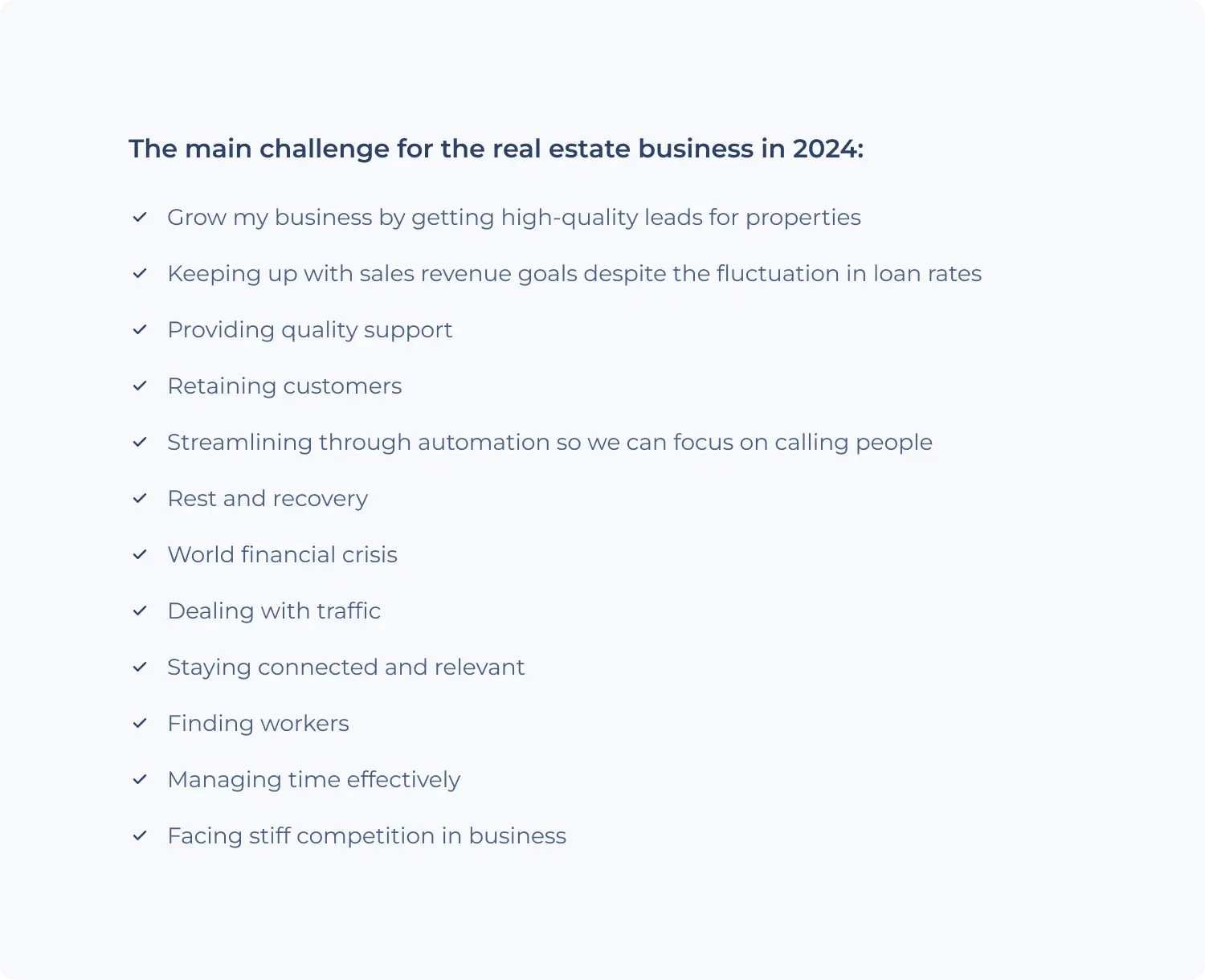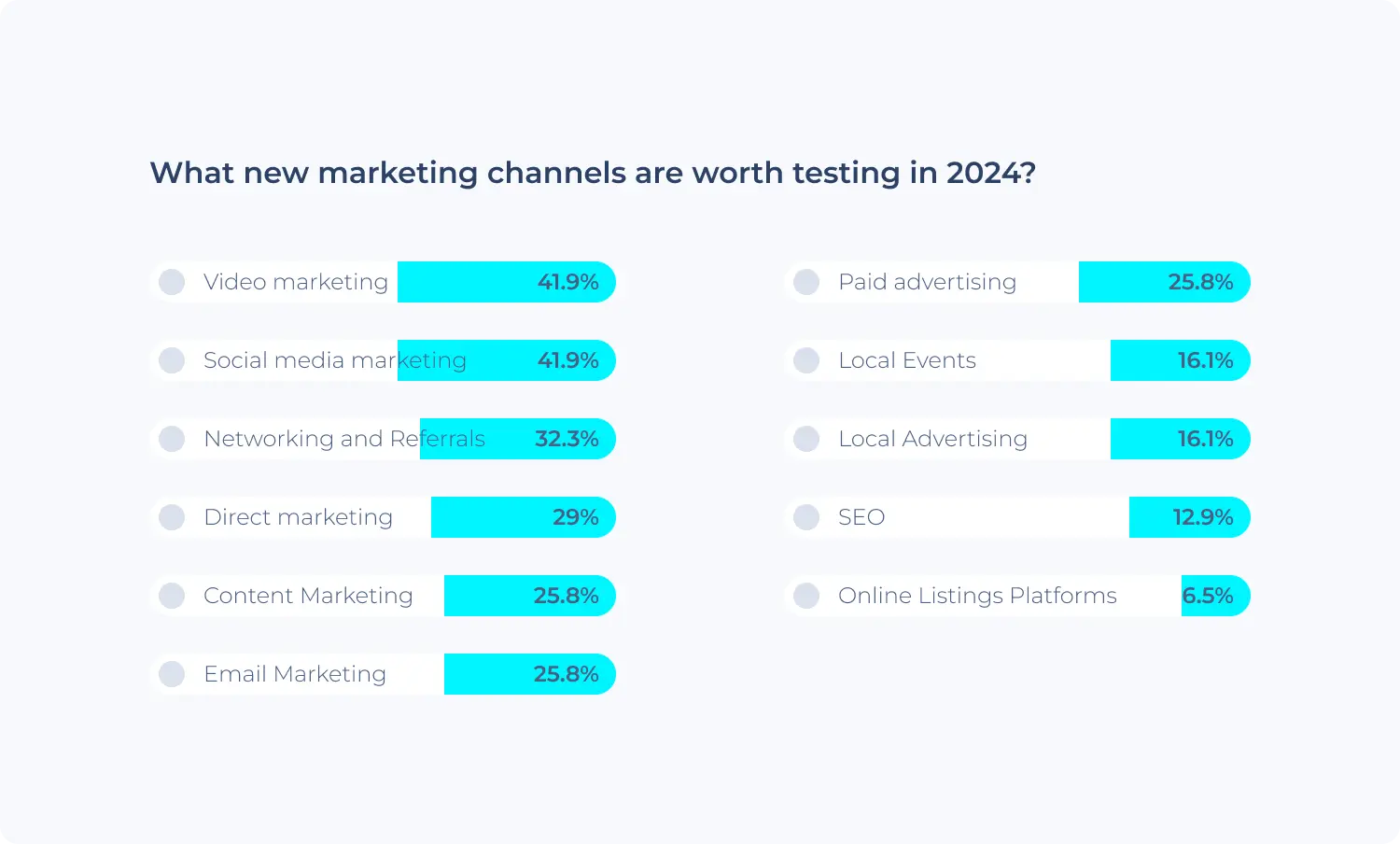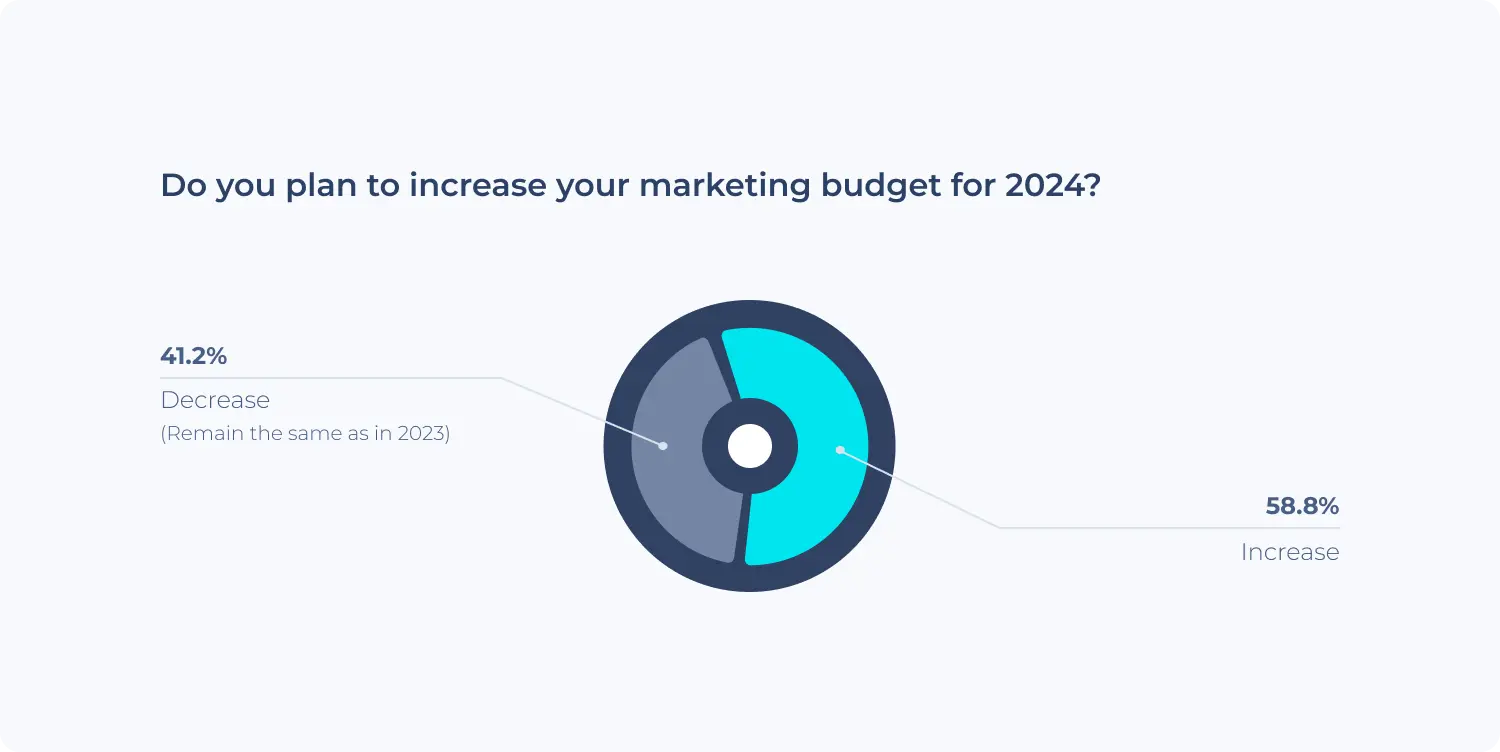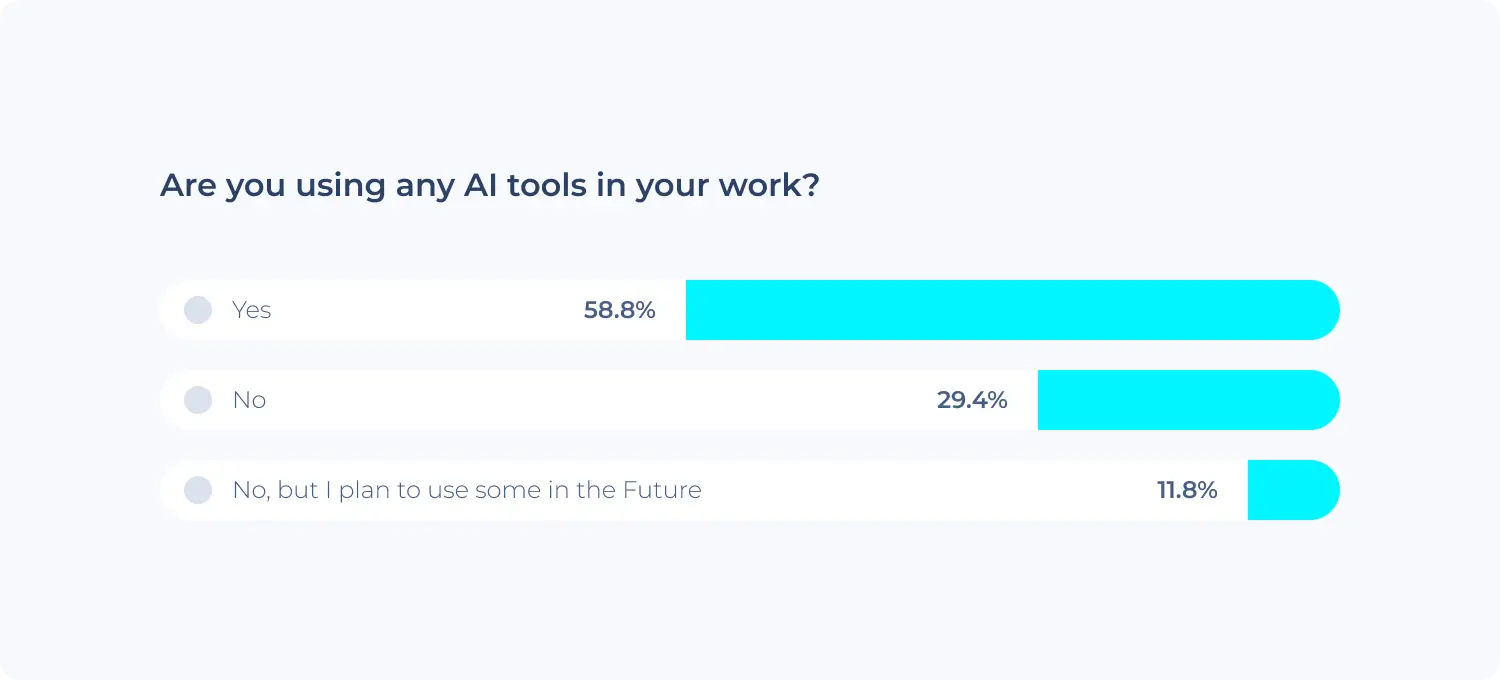In the fast-paced real estate industry, being visible is crucial for achievement. People talk a lot about new ways to market, like using fancy technology or social media. But what really works in 2024?
At MySignature, we wanted to find out. To gain insight into marketing trends for 2024, MySignature recently surveyed US-based real estate professionals, including brokers, agents, and company executives. We also asked dozens of real estate professionals, founders, and marketing managers what they do to succeed in the property market.

We learned a lot about what's working in real estate marketing right now. And we're excited to share those tips with you. Whether you're new to the industry or you've been doing it for years, we've got some smart ideas to help you stand out.
What is a real estate marketing?
Think of it as your guide to navigating the real estate market successfully. It blends traditional approaches with current tools like virtual showings and social media to capture the interest of your potential clients.
A well-crafted real estate marketing plan typically includes the following elements:

One of the most important components is the selection of marketing channels and tactics that outline how you will attract potential customers. When you're just starting out in real estate, it's hard to figure out what works and what doesn't when it comes to attracting leads. Let us help you!
Marketing strategies for real estate agents for 2024
Before delving into the specific marketing strategies that will address the challenges in 2024 and our expert tips, let's examine the key hurdles that realtors expect to face.
We asked the interviewees what the main challenge was in their business and what real estate marketing tactics they were going to use. Here is what they answered.
What is the main challenge for the real estate business in 2024?

We see many pressures and challenges that real estate industry specialists want to handle — from securing high-quality leads for properties to finding time to relax. As one of our respondents wrote, "I took a break, and people forgot I'm a realtor."
It's clear we need to draft our marketing strategy to focus on the most important thing despite the plethora of challenges. Exactly, focus is the main part of your email marketing strategy.
Let's take, for example, this insight from Seth Williams; he is a real estate investor and the founder of REtipster.com:
"Your marketing strategy depends on whether you're looking for buyers or sellers. It also depends on which market you're working in and what property types you're dealing with. I know people who have had success with every marketing medium out there: direct mail, cold calling, texting, ringless voicemail, online ads, social media posting, and more. All of them can work if you're consistent and smart about implementing them, but it's hard to do all these things simultaneously. If you're just getting started, I would pick one or two of those mediums and focus on being the best at those rather than trying to do everything at once."
Our survey respondents share a similar opinion. We asked what the main piece of advice real estate agents could offer for successfully executing a marketing strategy in 2024. The consensus? Consistency is key! Read more about consistency below!
Key elements of a successful marketing strategy:
Here are additional insights from real estate agents on crafting a successful marketing strategy:
Be consistent
Create a plan and stick to it in branding, social media, and content marketing. Think of it this way: when you have a plan and stick to it, you're weaving a strong, unified thread through everything you do. It's like you're creating a seamless experience for your audience, where they know what to expect from your brand at all times. Whether it's the tone you use, the visuals you share, or the messages you deliver, consistency builds trust and keeps people coming back for more. You can also hire some help from companies like Virtual Latinos with highly skilled and industry-specialized real estate virtual assistants that can help you with this and other tasks.
Be honest
It's really about relationships, not just money spent on marketing. Being transparent, focusing on customer needs, and handling setbacks with grace builds trust. In today's world, honesty wins because burying negative feedback doesn't work. Instead, use it to improve your services and enhance your reputation. Remember, your authenticity is your secret weapon when it comes to client relationships.
Differentiate yourself
Branding is essential for real estate agents, and 50.6% of those surveyed prioritize it highly. It's more than logos; it's creating a consistent image and videography that earns the client's trust. Being consistent across all platforms ensures you stand out and attract loyal clients in a competitive field. One way to elevate your service and responsiveness is by providing the best customer service which could be done by hitting a property management answering service to ensure clients always receive timely, professional communication.

Think of your email signature as your virtual handshake. 52% of real estate agents say a solid email signature is key for chatting with clients. A tiny 3.4% disagree.

It's where you can share your contact info or show off your latest listings in every email.
Need a hand making yours stand out? Here's the Real Estate Email Signature Checklist.
With MySignature, crafting sleek, professional email signatures is simple, ensuring you impress clients with every message.
Develop a funnel
Don't expect conversions from a single touchpoint - be approachable and present everywhere. Run branding campaigns alongside lead generation campaigns. Start by doing one thing on the platform you are most comfortable with and be authentic. Leveraging full-site crawling and data extraction can help you monitor competitor listings, pricing trends, and market demand, giving your funnel a data-driven edge.
Once we've established the key elements of a successful marketing strategy, let's delve into the specifics of marketing channels and identify the most effective platforms for promoting your real estate business.
What type of marketing channels is best for real estate?
Based on the MySignature survey, here are the leading marketing channels that stood out for their effectiveness in the real estate sector:

So, social media has become crucial for marketing and sales in real estate in 2023, and it seems like nothing will stop it from being relevant in 2024 as well.
"Social media is not just an option for marketing – it's a necessity. It provides unparalleled opportunities for brands to engage with their audience, amplify their message, and drive meaningful business results." – Rand Fishkin, co-founder of Moz and SparkToro!
Email Marketing
Surprisingly, you can see that email marketing is one of the top three most productive marketing channels. You also should know that email marketing has a huge ROI (return on investment). The average ROI for email marketing is $36 for every $1 spent. In other words, investing a dollar yields a return of 36 times that amount. Real estate agencies focusing on outreach may find that email marketing software supports their efforts to connect with potential clients more effectively.
As we explore effective marketing channels, it's crucial to recognize the power of personalization in today's digital landscape. Roman Hotsiak, an industry expert and CEO of Didoagency, highlights this, stating:
"Consumers expect personalized experiences more than ever. For real estate agencies, this means segmenting your email list based on customer interests, behaviors, and past interactions. By personalizing email content, we've seen open rates increase by up to 26%, significantly enhancing engagement and conversion rates."
This insight emphasizes the need for real estate agencies to adapt their email marketing strategies, showcasing the tangible benefits of customization on engagement and conversion rates.
Another important marketing channel for real estate is SEO.
SEO
In 2024, SEO isn't just about keywords anymore; it's about creating valuable, engaging content that addresses the needs and questions of your target audience. For real estate agents, this means crafting informative blog posts, neighborhood guides, and property descriptions that not only capture the attention of search engines but also resonate with potential homebuyers.
Networking
Investor Mark Ferguson recommends taking a look at networking as a powerful tool for real estate professionals:
"The best marketing channel is the same as it has always been: networking with people in person. Through church, clubs, luncheons, kids' events, school, work, etc. Build personal relationships, and those will last a lifetime, and those people will tell their people about you."
Content marketing
Content marketing in real estate helps agents establish trust, attract leads, and stand out in a competitive market.
This insightful perspective is shared by Iryna Kutnyak, Director of Operations at Quolead:
"By creating valuable and relevant content, real estate professionals can engage with potential clients early in their buying or selling journey, positioning themselves as industry experts.
Effective content marketing strategies for real estate include creating local market reports, maintaining a strong online presence and utilizing influencer partnerships. Additionally, focusing on thought leadership, aligning your brand's voice with buyer personas, and spotlighting successful client stories can enhance credibility and engagement."
Direct marketing
It's impossible to overlook the power of direct marketing when delving into the nuances of successful real estate marketing strategies. Let's take a look at the expert experience.
Tyler Austin, founder of REISift, and Ryan Dossey, founder of Call Porter, both expanded their investing ventures utilizing direct mail. While they may have employed additional strategies, direct mail consistently serves as the cornerstone upon which real estate investors construct their businesses.
But if you want to test direct mail, take note that according to MetroDepth, the average response rate for real estate direct mail is between 2% and 4%. It helps to determine the value of sending emails.
Additionally, incorporating a guest welcome app like Touchstay can enhance your direct marketing efforts by providing personalized information and recommendations directly to clients, increasing engagement and satisfaction. Real estate professionals are now leveraging dynamic QR codes to further transform these direct marketing materials, creating instant digital bridges that allow potential clients to seamlessly access property details, virtual tours, and agent contact information with a simple smartphone scan.
That was the most effective and popular marketing channel for real estate in 2023. Now, let's take a look at the marketing channels the real estate industry plans to test as new in 2024.
What new marketing channels are worth testing in 2024?
Exploring new marketing avenues can significantly impact your brand's visibility and growth. Here's how various channels stack up in 2024 based on their popularity:

YouTube and TikTok have become more popular in real estate. It's not just about showcasing apartments in videos but also about building a personal brand and fostering relationships with potential customers. To support this position, we have a comment from Seth Williams about video marketing channels:
"My audience has been responding well on YouTube and Facebook, but those are also the channels where I've invested the most time and effort."
On the other hand, it's also important to pay attention to the efforts and budget that you can allocate to test new strategies:
"The grass is greenest where you water it, so I recommend choosing the channels or marketing mediums you're most comfortable and competent with and doubling down on those. Especially if it's something you already enjoy on some level, it will be a natural fit, and you'll find it easier to improve at something you already enjoy doing." – Seth Williams.
If all roads lead to Rome, in marketing, all marketing channels are faced with marketing budgets.
According to our survey, 58.8% of real estate brokers plan to increase their marketing budget.

To know which marketing channels and campaigns to try, it's important to calculate the cost of customer acquisition (CAC). CAC is calculated by dividing the total marketing spend by the number of new customers acquired in a given period.
These costs can vary widely in real estate marketing depending on the marketing channels used:
- Pay-per-click (PPC) advertising on platforms such as Google Ads or social media platforms.
- Search engine optimization (SEO) to improve the organic visibility of your site in search engine results.
- Social media marketing (SMM) on platforms such as Facebook, Instagram, and LinkedIn.
- Content marketing can be done in the form of blogs, videos, or eBooks.
Understanding the customer acquisition cost (CAC) before testing new marketing channels is critical because it allows real estate marketers to make informed decisions about resource allocation and potential ROI.
AI and real estate marketing
Artificial Intelligence (AI) is revolutionizing industries, and real estate is no exception. It is reshaping real estate marketing by automating and personalizing tasks. This technology helps target the right buyers and streamline the selling process, making it not only quicker but also more effective.
According to MySignature's survey, 57.1% of real estate brokers and companies are using AI services, and 28.6% plan to use them in the near future.

Yuriy Gnatyuk from Kindgeek says that one of the best options is fine-tuned GPT AI Assistants, which carry transformational potential and can help you elevate your customer service, improve operational efficiency, and drive business growth amid an ever-evolving market:
"In today's dynamic fintech landscape, in which competition is fierce and customer expectations are high, embracing a smart and strategic approach to innovation is crucial for relevance and long-term success."
Seth Williams noticed that AI gives businesses a big advantage by making them more efficient and effective at their jobs. He warns that companies not using AI are missing out on these benefits.
"I'll be the first to admit, building a business alone is a significant challenge. Anyone who isn't already leveraging AI is missing out, and the opportunities and applications will improve as it continues to evolve. If a person has the budget for it, it's also wise to hire an administrative assistant who can handle the lowest-value (but still important) tasks that need to be done every day. The book "Buy Back Your Time" by Dan Martell has a lot of valuable insights on this topic."
Keep reading to find additional advice and comments from experts featured in this article.
50+ unique marketing ideas for real estate by experts
We've put together some top real estate marketing ideas that successful agents use. Whether you're new to the game or a seasoned realtor wanting more clients, these tips can help you build a winning marketing strategy.
Real estate marketing ideas for social media
- Virtual open house tours
Use Facebook Live or Instagram Stories to give potential buyers live virtual tours of your property. This interactive experience can draw more attention and make viewers feel like they're right there with you.
- Before and after renovation photos
Share transformation photos of properties you've sold or are in the process of selling. This demonstrates your ability to see potential in properties and can inspire buyers to imagine their own transformations.
- Client testimonials and success stories
Post short video clips or quotes from satisfied clients. Personal stories resonate on social media and build trust with your audience.
- Neighborhood highlights
Create posts that highlight the benefits of living in the neighborhoods where you have listings. Highlight local businesses, parks, schools, and community events to provide a well-rounded view of the area.
- Interactive polls and questions
Engage your followers by asking them what they look for in a dream home or what they think about home design trends. This not only increases engagement but also gives you valuable insight into your audience's preferences.
- Personalized approach with direct messages
A key tactic in social media marketing for real estate is personalizing your outreach. Direct messaging on platforms like Instagram and LinkedIn offers a unique opportunity to connect individually with potential clients. And, if you don't have a potential client list, lead generation services can help get you started. Tailor your messages based on the recipient's interests or recent activities to show genuine engagement. This personalized strategy within your social media marketing for real estate can significantly boost the chances of turning leads into clients by making them feel uniquely seen and valued.
Note that it's essential not to lose sight of the core of every business: building and nurturing relationships. In the words of real estate expert Mark Ferguson:
"The best way to build and maintain relationships has not changed. Many people think it has changed with social media and all the new technology, but people still want to feel special. Posting on social media for everyone to see is not special. If you want to build or maintain relationships, you still need to reach out personally to clients. You may be able to reach out in different ways, through direct messages or texts, but people feel special when you think of them and reach out, especially when you don't need to. Keep in touch with your clients, take time to reach out, send birthday messages, and hold events once in a while where people can see you face to face."
This powerful reminder from Ferguson underscores that amidst all our digital tactics and tools, the human touch remains invaluable. Let's remember to prioritize personal connections as we navigate through our social media marketing efforts.
- Short videos
Create and share short, informative videos on platforms like Instagram Reels, TikTok, or YouTube Shorts. Topics could include home staging tips, quick market updates, or highlights from your latest listings, providing all the necessary details within the video itself.
- Engagement through polls
Leverage Instagram Stories and X polls to interact with your audience. Ask them about their preferences in real estate, their predictions for the local market trends, or the qualities they desire in their ideal home. This method doesn't necessitate a click-through, yet it can notably enhance engagement levels while providing you with crucial insights into what your audience values.
- X Threads
Craft detailed X threads on topics that warrant a deep dive, like "10 Essential Tips for First-Time Homebuyers." Make sure every tweet in the series offers substantial information, allowing your followers to gain valuable insights without having to navigate away from Twitter.
- LinkedIn articles
Share in-depth articles on LinkedIn that cater to the interests of your target demographic, covering subjects such as market trends, investment advice, or how to select the perfect neighborhood. LinkedIn's format supports comprehensive articles, enabling you to captivate your audience directly on the platform without the need for them to visit your external website.
- Pinterest pins
Create detailed pins that serve as full guides or checklists, like the "Ultimate Moving Checklist" or "Home Staging Essentials." Design these pins so users can get all the information they need directly within Pinterest, eliminating the necessity for additional clicks to a blog or external site.
- "Ask an expert" series
Host live sessions on Instagram, Facebook, or YouTube, where you answer real estate questions in real time. You can also feature guest experts from different real estate sectors to provide diverse insights and perspectives.
Real estate content marketing ideas
- "Day in the life" neighborhood features
Use a mix of photos, videos, and narratives to capture what a typical day looks like in various neighborhoods you serve. This immersive content marketing strategy can help potential buyers picture their life in different communities.
- DIY home improvement projects
Share simple, budget-friendly home improvement projects that can add value to a property. This type of content appeals to both sellers looking to improve their home's marketability and buyers considering renovations.
- Local market analysis videos
Create short, insightful videos that analyze local real estate market trends. This real estate content marketing tactic can help you engage an audience looking for investment insights or buying/selling advice.
- Home staging tips
Offer advice on staging homes for sale, including before and after photos. This type of content is highly shareable and positions you as a knowledgeable industry leader.
- Start a real estate insights podcast
Launch a podcast that delves into real estate market trends, offers investment advice, and shares success stories. Each episode could include expert interviews, tips for navigating the market, etc.
- Real estate checklists
Create some easy-to-follow checklists for anyone looking to buy, sell, or invest in real estate. Think of them as your insider tips to make sure they cover all their bases – like what to look for before closing on a new home or how to make their home irresistible to buyers. Post these checklists on your website, share them on your social networks, and keep a few printed copies handy to hand out at open houses or when you're out meeting people.
- Home buying and selling infographics
Create informative infographics that provide key tips for buyers and sellers, such as "Top factors to consider before buying your home" or "How to maximize your home's value before selling. Distribute these informative visuals on your website, social media platforms, and as handouts at open houses or local seminars. This approach not only positions you as a knowledgeable real estate resource but also ensures that your advice is easily accessible and shareable.
- Landing page
Create a landing page using a real estate website builder that guides visitors through the home buying or selling process with easy-to-follow sections such as "Buyer's guide," "Seller's strategy," and "Investment tips. Include engaging visuals, quick tips, and a clear call-to-action to schedule a consultation or sign up for updates. This page will inform your audience and encourage them to contact you for customized real estate advice.
- Success stories
Share stories of successful sales or satisfied customers in a blog or video format. This builds trust and shows the personal side of your business.
As we try out all these different ideas to talk about properties, let's not forget the power of visual content to get people interested and dreaming. Seth Williams says it best:
"Good real estate marketing is more than just showing the place. It's about making people see themselves living there. A good photo can make a huge difference. It catches eyes and tells a story all by itself."
If you're seeking top-tier content to drive lead generation, take a look at helpful infographics by SEMrush:

Real estate direct mail marketing
- Exclusive listings preview
Send a preview of your exclusive or upcoming listings to a select group of potential buyers. This makes them feel special and keeps them engaged with your listings.
- Neighborhood event invitations
Host a community event, such as a home improvement workshop, neighborhood block party or open house, and use direct mail to invite the local community. It's a great way to meet potential customers in a relaxed setting.
- Seasonal maintenance tips
Send seasonal greeting cards with helpful home maintenance tips. For example, winterize your home tips in the fall or spring cleaning checklist in the spring. This will keep your name in their minds throughout the year.
- Personalized market analysis offers
Offer a free, no-obligation market analysis to homeowners. Personalize the email with their name and address to capture attention and provide value from the start.
- Referral program insight
Launch a referral program to boost your real estate direct mail marketing efforts. Email past clients and locals about this opportunity, highlighting rewards for those who introduce new clients to your services.
Email marketing for real estate
- Client lifestyle features
Instead of just listing homes, create lifestyle segments in your emails that match properties to specific client lifestyles, such as eco-friendly living, homes with history, or perfect family neighborhoods.
- Real estate myths debunked
Address common myths and misconceptions about buying and selling homes. This informative, myth-busting content can be both enlightening and entertaining for your audience.
- Animated infographics
Use animated infographics to explain market trends, the home buying process, or investment tips. These are more engaging than static images and can help simplify complex information.
- Collaborations with local businesses
Feature promotions or stories from local businesses near your listings. This not only supports the community but also paints a fuller picture of the lifestyle clients can expect.
- "Ask an expert" series
Invite clients to email questions about real estate, home care, or market trends, then answer them in your newsletters. This interactive content keeps readers engaged and looking forward to your emails. In these newsletters, you can share insights on recent trends that can help safeguard investments for the subscribers of your newsletter. For example, you can share information about MLS lawsuit and highlights information about the losses faced by investors due to unfair commissions.
This not only educates potential buyers but also enhances the trustworthiness in your content. You can also use email verification tools. Similarly, applying this approach to social media channels works wonders. Host live sessions on Instagram, Facebook, or YouTube, where you answer real estate questions in real time.
- Boosting your email impact with an email signature
When you're running email marketing campaigns, think of your email signature as your handshake – it shows who you are. But don't stop there. Adding email tracking is like having eyes and ears out there. It tells you who's really reading your emails and clicking on your signature links. It's a game changer. You get to know what works and what doesn't, making your emails smarter and more on point. So, mix a professional email signature with some savvy tracking, and watch your campaigns get way more effective. MySignature not only helps you create professional and memorable email signatures but also offers email tracking capabilities. With MySignature, you get the best of both worlds. You can design a signature that captures your brand perfectly and, at the same time, see who's paying attention to your emails.
Real estate video marketing
- Customer journey testimonials
Create testimonial videos in which past clients share their journey from home search to homeownership with your help, demonstrating your support and expertise throughout the process.
- Behind the scenes of a real estate agency
Offer a behind-the-scenes look at your real estate agency, including day-to-day operations, how you match buyers with their dream homes, and the teamwork involved in closing deals.
- Home transformation time-lapse
Capture the renovation or construction process of a property in a time-lapse video. From the initial demolition to the finishing touches, this visual journey can dramatically showcase the value added by the transformation.
- Property matchmaking game
Create a fun, interactive video series where you match buyers with their perfect home based on their preferences and reactions to different properties. This gamified approach can entertain while demonstrating how well you understand their needs.
- Sustainability spotlight
Focus on eco-friendly and sustainable features of properties in your portfolio. Highlight green initiatives, energy-efficient designs, and sustainable materials in use, appealing to environmentally conscious buyers.
When it comes to real estate marketing effectiveness, Seth Williams captures the essence of what makes video content truly stand out:
"Videos have the power to bring properties to life. They invite viewers on a virtual journey, offering a glimpse of the life that awaits them. A well-produced video isn't just content, it's an experience."
His perspective sheds light on how videos do more than show a space – they create an immersive experience that draws potential buyers into imagining their future in a new home.
Local real estate marketing ideas
- Seasonal lifestyle shoots in listings
Hire a real estate marketing agency to conduct lifestyle photo shoots in your listings according to the season. Showcase these photos in your real estate ads, flyers, and on social media to depict what life could look like for potential buyers in those homes throughout the year.
- Branded community projects
Create a real estate marketing campaign around a community project, like a park cleanup or a local mural painting, incorporating your real estate logo design into the project. Document the process and share it across your real estate website design and social media platforms, showing your commitment to the community and blending real estate marketing with genuine community service.
- Street fair booths
Secure a spot at your town's next street fair to set up a booth. Offer free, no-obligation advice on finding the perfect home or preparing homes for sale. This face-to-face interaction can build trust and generate word-of-mouth referrals.
- Sponsor a local sports team
Get your name out there by sponsoring a youth or amateur sports team in your area. Not only does it show your investment in the community, but it also puts your name in front of families who may soon be looking to buy or sell their home.
- Coffee shop consultations
Partner with local coffee shops to offer free real estate consultations one morning a month. Customers can enjoy their coffee while receiving professional real estate advice. It's a relaxed way to introduce your services and answer questions in a no-pressure environment.
- Seasonal decorating contests
Invite locals to decorate their homes for the season or holiday and submit photos. Share the entries on your social media channels and let the community vote for their favorites. Winners can receive a small prize or recognition in the local newspaper. This fun activity can increase engagement with your brand and bring the community together.
Offline real estate marketing ideas
- Pop-up information booths at community events
Set up information booths at popular local events, such as farmers markets, festivals, and school sporting events. Offer free, valuable real estate-related information, such as first-time homebuyer guides, home appraisal estimates, or small space decorating tips. Take advantage of this opportunity to hand out branded merchandise, real estate marketing postcards and flyers that include your contact information, real estate marketing listings and services offered. This direct interaction is a great way to build trust, generate leads, and increase your visibility within the community.
- Local market insight seminars
Host educational seminars that delve into the nuances of the local housing market, property development trends, and neighborhood analysis. Use real estate software to present data-driven insights and distribute branded materials that attendees can take home. This not only positions you as a knowledgeable broker but also enhances your real estate networking and client acquisition efforts.
- Branded real estate advice columns in local newspapers
How about working with local newspapers to write a weekly or monthly real estate advice column? You can discuss topics such as understanding the housing market, tips for first-time buyers, or how to choose the right real estate investment. Include your professional bio with a headshot and clear, branded business card image, inviting readers to contact you for personalized advice or brokerage services.
- Real estate discovery walks
Organize guided walks through neighborhoods where you actively list and sell homes. Before the walk, distribute a packet to participants that includes a neighborhood analysis, highlights of the area's real estate development potential, and tips for buyers and sellers.Be sure to include your business card in each packet, and consider adding a small branded token, such as a keychain or magnet, as a souvenir. This unique approach allows for direct networking and demonstrates your in-depth knowledge of the market.
"The best marketing channel remains as it always has been: networking with people in person. Through church, clubs, luncheons, kids' events, school, work, etc., build personal relationships. These relationships can last a lifetime, and those people will tell others about you." – Mark Ferguson
Real estate advertising
- Lifestyle matching ads
Create listings which go beyond showcasing the property and align it with a lifestyle. For example, target ads featuring homes with large backyards and outdoor kitchens to an audience interested in gardening and outdoor entertaining. Use data about interests and hobbies to tailor your ads.
- Interactive income-level property guides
Create interactive guides that recommend properties based on the user's income level, preferred geographic location, and other financial factors. Target these guides to audiences based on their buying patterns and financial interests.
- Work-from-home paradises
In response to the growing trend of remote work, it may sound like a great idea to start a campaign that focuses on properties that offer ideal work-from-home environments. Highlight properties that offer dedicated office space, excellent internet connectivity, and peaceful surroundings that promote productivity. Target this campaign to professionals who frequently engage with remote work tools and online productivity content, or who have shown an interest in home office design ideas.
Identify your visitors
Here's one last piece of advice to wrap this up: To improve your sales and marketing, it's critical to really know your prospects. Our advanced data analytics platform fuses information from your website visits and email interactions to help you pinpoint your most interested prospects. And that's exactly what PearDiver does. It gives you insight into who's window-shopping your listings or services, turning those anonymous clicks into real conversations.
Wrapping up: Your journey to distinguishing your brand in real estate
With intense competition in the market, distinguishing yourself requires mastery of both digital and traditional marketing techniques. Implement these distinct real estate marketing strategies to stand out from the crowd. Now, take your time and implement the tactics one step at a time, rather than trying to do everything at once. Good luck on your journey.
This report is presented by MySignature – an email signature marketing platform. MySignature transforms business email communications by enabling marketers and business owners to add professionally designed, interactive signatures to their emails. With clickable banners, branded social media icons, and eye-catching call-to-action buttons, emails become a powerful and highly targeted marketing tool.
Real estate marketing plan 2024 in PDF
Feel free to download all of the above materials in PDF format so you have everything you need at your fingertips, whenever you need it.

FAQ
What are the 4 P's of marketing in real estate?
The 4 P's are a classic marketing framework, tailored to effectively sell or rent real estate:
Product: This refers to the property itself, including its design, features, and location.
Price: This is the cost at which the property is being marketed, taking into account its value and market trends.
Place: This includes both the physical location of the property and the platforms on which it's listed for sale or rent.
Promotion: This includes all strategies used to promote the property, from online listings to traditional advertising.
By focusing on these 4 P's, real estate professionals can optimize their marketing efforts to attract buyers or renters.
How do you write a marketing plan for real estate?
Creating a marketing plan for your real estate business involves several strategic steps:
- Market analysis
- Identify your target market: Understand who your prospective buyers or renters are. Consider demographics, preferences, and behaviors.
- Do competitive analysis: Evaluate your competition. What do they do well? What are the gaps you can fill? Implementing web scraping techniques can help gather comprehensive market data on competitor.
- Clear goals
- Define what you want to accomplish with your marketing efforts. This could be increasing property sales, increasing brand awareness, or entering new markets.
- Marketing strategies
- Work on real estate branding: Develop a strong brand identity that sets you apart from the competition.
- Have an online presence: Ensure your website is user-friendly and optimized for search engines. Use social media to connect with your audience.
- Work on content marketing: Use blogs, videos, and property listings to provide valuable information to your target market.
- Network: Leverage industry connections through events and partnerships.
- Budgeting
- Determine your marketing budget. Allocate funds wisely to different channels that provide the best return on investment.
- Action plan
- Outline specific actions to implement your strategies. Include timelines, owners, and resources needed.
- Monitoring and evaluation
- Track your progress and measure the effectiveness of your marketing efforts. Adjust your plan as needed based on performance data.
What is the meaning of real estate marketing?
The methods and practices used to promote and advertise real estate properties to potential buyers are referred to as real estate marketing. It includes a variety of strategies and tactics used to attract and engage potential customers, generate leads, and close deals.
What is project marketing in real estate?
Project marketing in real estate focuses on promoting specific development projects, such as residential or commercial complexes, to attract buyers or investors. It involves strategies to highlight the project's unique features, benefits, and lifestyle through various advertising channels with the goal of generating interest and driving sales.


